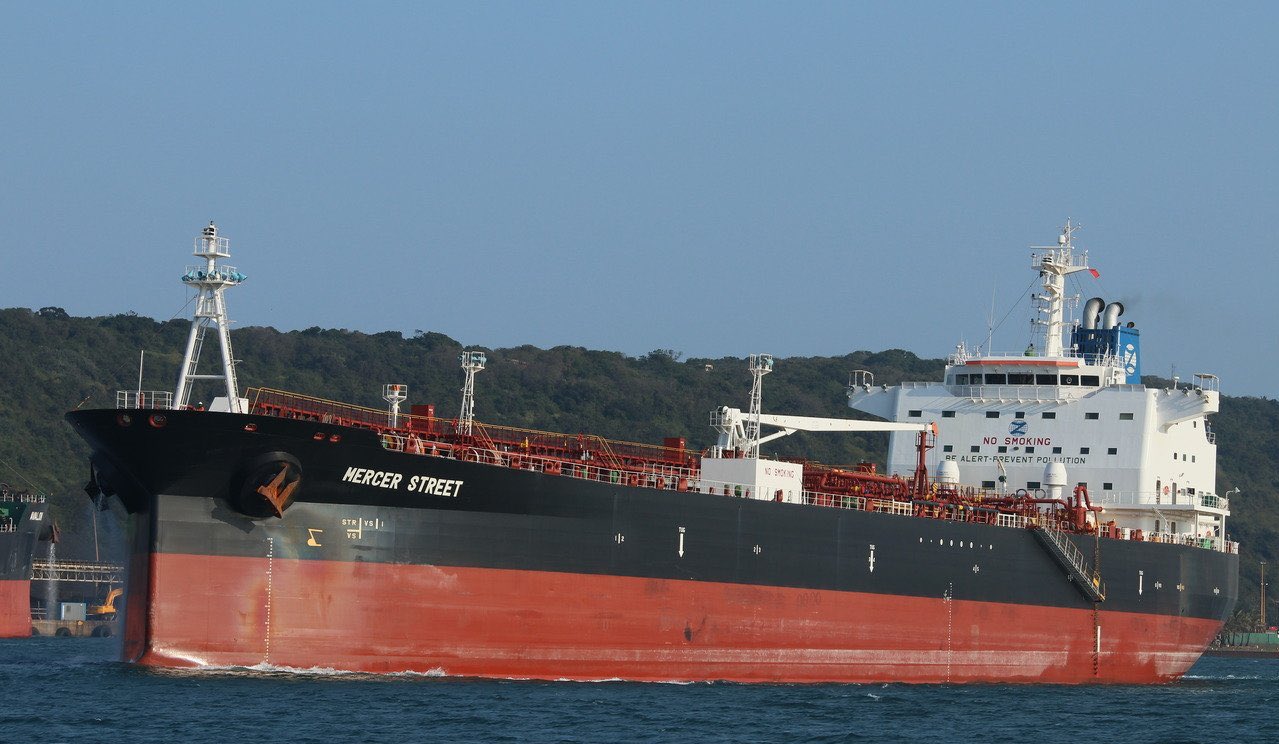The Liberian-flagged, Japanese-owned petroleum tanker was attacked on July 29, where two were killed.
Qatar has condemned last week’s attack on the Mercer Street oil tanker off the Omani coast, calling for regional security and stability to be maintained.
“Qatar called for resorting to the international law to ensure that such attacks would not be repeated in the future, to maintain security and stability in the region,” a statement issued by Doha’s foreign ministry [MOFA] read on Monday.
The statement went on to reiterate the Gulf state’s “rejection of actions that would disrupt the safety and security of international maritime transport and impede the movement of ships and tankers”.
The Liberian-flagged, Japanese-owned petroleum tanker was attacked on 29 July off the coast of Oman, killing two crew members – a Briton and a Romanian.
Shortly after the ambush on the vessel, its managing company, the London-based and Israeli-owned Zodiac Maritime, issued a statement saying that the ship was subjected to a cyber attack.
However, the US Navy, which helped escort the tanker following the attack, said on Saturday that early indications “clearly pointed” to a drone attack.
The US, Israel and Britain blamed Iran for the assault, citing ongoing tensions between Tel Aviv and Tehran – an allegation that the Islamic Republic denied.
“We conducted a thorough review and we’re confident that Iran carried out this attack,” US Secretary of State Antony Blinken told reporters at the State Department in Washington, DC on Monday, warning of a “collective response”.
“It follows a pattern of similar attacks by Iran including past incidents with explosive drones,” Blinken said.
Iran’s foreign ministry later replied to the claims, saying it will instantly respond to threats against its security.
Read also: Qatar’s FM meets Iran’s newly-elected leader Raisi in Tehran visit
“Iran has no hesitation in protecting its security and national interests and will respond promptly and strongly to any possible adventure,” Tehran’s Foreign Ministry Spokesman Saeed Khatibzadeh said, according to Iranian state television on Monday.
Newly-elected Israeli Prime Minister Naftali Bennett also accused Tehran of “trying to shirk responsibility” for the ambush, describing its denial as “cowardly”.
Meanwhile British Prime Minister Boris Johnson said that the attack was “outrageous” as James Cleverly, the UK’s minister for the Middle East, summoned Iranian ambassador Mohsen Baharvand.
Today, I summoned Iranian Ambassador to the UK, Mohsen Baharvand, to the FCDO.
I called on Iran to immediately stop destabilising actions that seek to undermine international peace & security. Iran’s callous attack on MV MERCER STREET was unacceptable. https://t.co/eMs6LdwTXv
— James Cleverly🇬🇧 (@JamesCleverly) August 2, 2021
“Minister Cleverly reiterated that Iran must immediately cease actions that risk international peace and security, and reinforced that vessels must be allowed to navigate freely in accordance with international law,” the Foreign Commonwealth & Development Office said in a statement on Monday.
The latest attack comes at a critical time as the US and Iran work towards restoring the 2015 nuclear accord. Former President Donald Trump withdrew from the deal in 2018, imposing crippling sanctions on the country.
However, since coming into power, US President Joe Biden has shown willingness to restore the nuclear deal, a move which Iran welcomed.
Newly-elected Iranian President Ebrahim Raisi’s policies regarding the Joint Comprehensive Plan of Action [JCPOA] appear to be the same as Hassan Rouhani’s, as both have been open to reaching a settlement to return to the accord.
However, Iran has accused Israel of trying to obstruct the path of the nuclear talks, which kicked off in April in Vienna with the attendance of the P4+1—Franke, the UK, China, and Germany.
In June, Iranian security forces thwarted a “sabotage attempt” on one of the Atomic Energy Organisation of Iran [AEOI] buildings, one of the country’s main manufacturing centres for the production of the centrifuges used in its nuclear facilities.
This was the second attack to take place during the Vienna talks, after an April ambush occurred at Iran’s Natanz nuclear facility, which Tehran described as “an act of nuclear terrorism”.
At the time, authorities in Tehran accused Israel of conducting the attack, citing its stance against the revival of the JCPOA.
Qatar has been a key regional mediator throughout tensions in the last few years, namely calming escalations in the aftermath of the 2020 assassination of Iran’s Major General Qasem Soleimani.
Doha has also offered to step in to help ease tensions between Washington and Tehran.
Follow Doha News on Twitter, Instagram, Facebook and Youtube







